Chapter 13: Professional and corporate ethics
Chapter learning objectives
Upon completion of this chapter you will be able to:
- explain and explore the nature of a 'profession' and 'professionalism'
- describe and assess what is meant by 'the public interest'
- describe the role of, and assess the widespread influence of, accounting as a profession in the organisational context
- analyse the role of accounting as a profession in society
- recognise accounting's role as a value-laden profession capable of influencing the distribution of power and wealth in society
- describe and critically evaluate issues surrounding accounting and acting against the public interest
- describe and explore the areas of behaviour covered by corporate codes of ethics
- describe and assess the content of, and principles behind, professional codes of ethics
- describe and assess the codes of ethics relevant to accounting professionals
- describe and evaluate issues associated with conflicts of interest and ethical conflict resolution
- explain and evaluate the nature and impact of ethical threats and safeguards
- explain and explore how threats to independence can affect ethical behaviour
- describe and discuss approaches to resolving ethical dilemmas encountered in professional accounting.
- explain and explore 'bribery' and 'corruption' in the context of corporate governance, and assess how these can undermine confidence and trust.
- describe and assess best practice measures for reducing and combating bribery and corruption, and the barriers to implementing such measures.

1 'Profession' versus 'professionalism'
 The terms profession and professionalism can be explained as follows:
The terms profession and professionalism can be explained as follows:
- Profession: a body of theory and knowledge which is used to support the public interest.
- Professionalism: taking action to support the public interest.
Profession
A profession is distinguished by certain essential and defining characteristics:
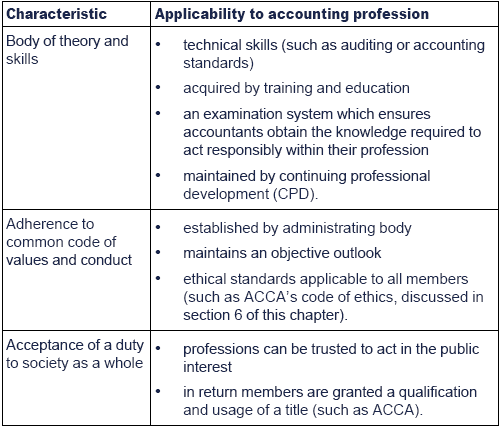
Professionalism
- Members are seen to be acting professionally, or literally having professionalism.
- Professionalism may also be interpreted more as a state of mind, while the profession provides the rules that members of that profession must follow.
- Professional behaviour imposes an obligation on members to comply with relevant laws and regulations and avoid any action that may bring discredit to the profession.
- Professional behaviour will mean complying with the ethical standards laid down by the professional body.
The accounting profession
- Over time, the profession appears to be taking more of a proactive, than a reactive, approach.
A reactive approach
Taking responsibility for any negative consequences of accounting practice and, where appropriate, amending those practices to remove those consequences.

 Illustration 1 – A reactive approach
Illustration 1 – A reactive approach
- Accounting practice failed to identify the risk that the Special Purpose Entities established by Enron to 'hide' its debts may not actually incorporated into Enron's main accounts.
- This may have attributed to the eventual downfall of Enron and the loss of pensions due to many Enron staff.
- The practice was removed by the requirement from the accounting profession to include this off balance sheet financing in the main accounts of companies.
- In this sense the accounting profession was reacting to a situation.

A proactive approach
Seeking out and positively contributing to the public interest.

 Illustration 2 – A proactive approach
Illustration 2 – A proactive approach
- The accounting profession recognises that guidance on how to carry out an environmental audit, or to accumulate appropriate metrics to include within an environmental audit, is not available.
- Guidance is provided 'in the public interest' as a benefit to society, rather than waiting until society as a whole requests the guidance.

2 The public interest
- The distinguishing mark of a profession is the acceptance of a responsibility to the public.
- The accountancy profession's public includes:
- clients
- credit providers
- governments
- employees
- employers
- investors.
 What is 'the public interest' ?
What is 'the public interest' ?
The public interest can be defined as that which supports the good of society as a whole (as opposed to what serves the interests of individual members of society or of specific sectional interest groups).
- For an accountant, acting in the public interest is acting for the collective well-being of the community of people and institutions that it serves.

 Defining 'public interest'
Defining 'public interest'
There is much debate over a definition of the term 'public interest'. However, the public interest is normally seen to refer to the 'common well-being' or 'general welfare.'
An action is usually thought to be in the public interest where it benefits society in some way. It is unclear though how many members of society must benefit before the action can be declared to be in the public interest. Some people would argue an action has to benefit every single member of society in order to be truly in the public interest. At the other extreme, any action can be in the public interest as long as it benefits some of the population and harms none.
There is a potential clash between the public interest and the interests of society as a whole. In other words, what is good for society may not necessarily be good for individuals, and visa versa.
Public interest versus human rights
Acting in the public interest may seriously affect the idea of human rights, i.e. the degree to which members of society are allowed to act on their own. One view is that individuals should be free to act, as long as those actions do not harm other individuals.
The public interest and human rights will clash where:
- the action of an individual adversely harms other members of society, and
- actions of the state adversely affect some or all members of society.
For example, the action of an individual in injuring another member of society clearly affects the rights of the injured person. The state may legislate against injury, and remove rights from individuals involved in injuring others, i.e. imprison them. While this may be against the human rights of the person carrying out the injury, the overall public interest is served because society is a safer place.
Public interest and companies
The concept of public interest may affect the working of an organisation in a number of ways:
- The actions of a majority of the shareholders may adversely affect the minority shareholders. Protection of minority rights, in the public interest, may be required where the minority are denied certain rights such as access to dividends or decision-making processes.
- The actions of the organisation itself may be harmful to society, e.g. from excessive pollution or poor treatment of the labour force. The government may then decide, in the public interest, to limit the actions of that organisation for the greater good of society as a whole.
Public interest and legal cases
In law, public interest is a defence to certain lawsuits (e.g. some libel actions in the UK) and an exemption from certain laws or regulations (e.g. freedom of information laws in the UK).

 Accountants and the public interest
Accountants and the public interest
- Accountants do not generally act against the public interest.
- The ethical code applicable to most accountants confirms that such action is not normally appropriate.
An area of particular relevance to accountants will be that of disclosure of information:
- The concept of acting in the public interest tends to apply to providing information that society as a whole should be aware of.
- In many cases 'public interest' disclosure is used to establish that disclosure is needed although there is no law to confirm this action.
- This can affect companies where they are acting against the public interest as disclosure may well be expected.
Disclose or not ?
The accountant will need to evaluate each situation on its merits and then justify the outcome taken:
- In some situations lack of disclosure may be against the public interest.
- In other situations, disclosing information may be against the public interest, and such information should be kept confidential to avoid harm to society.


 Acting in the public interest
Acting in the public interest
The public interest can be defined as that which supports the good of society as a whole (as opposed to what serves the interests of individual members of society or of specific sectional interest groups). Acting against the public interest therefore means acting against the good of society as a whole, or alternatively serving the interests of individual members of society or interest groups rather than society as a whole.
Acting in the public interest can also be applied to the provision of information about accounting or the actions of organisations or other institutions. Acting against the public interest therefore implies that information is not being made available by accountants to the public when that information should be made available. Similarly, there may be situations when disclosure would not be in the public interest, i.e. information should be kept confidential to avoid harm to society.
Public interest disclosure of information is expected within the ethical guidance provided by most accountancy bodies. Taking action against the public interest is not therefore something that accountants contemplate lightly.


 Test your understanding 1
Test your understanding 1
Provide examples of situations where:
(a)Disclosure of information could be seen as acting in the public interest.
(b)Lack of disclosure of the information could be seen as acting in the public interest.


 Test your understanding 2
Test your understanding 2
Situation A
A recently hired junior accountant in a public company becomes aware of accounting irregularities regarding the consolidation of subsidiaries into the holding company accounts. The effect of the consolidation irregularities was to understate the liabilities of the group in the group accounts. When this was mentioned to a colleague he was informed that the company had always used this method and that it was not worth reporting as the finance director always ignored the comments made and suggested that the matter was forgotten or the salary review would be unfavourable. The junior decided to take the colleague's advice.
Situation B
A senior auditor working on the external audit of a public company, becomes aware of a breach of health and safety regulations at the client. The auditor noted that the packaging on some eggs which the company obtains from hens it owns contained the term 'free range – farm society monitored and tested'. However, a review of the expenditure showed that there was no expenditure to the farm society. Further investigation indicated that the eggs may not have been free range, but actually imported from another country where the eggs were produced by 'battery' chickens. In other words the eggs were not free range and were unlikely to have even the basic control checks carried out on eggs produced at the company. The package labelling was therefore incorrect on two counts. The senior auditor mentioned this to the board of the client, whereupon the auditor was threatened with removal from office if the information was disclosed. However, the auditor disclosed the information anyway to the appropriate government department.
Required:
Discuss the two situations above in terms of Kohlberg's theory and with regard to public interest disclosure.

3 Accountants' role and influence
Influence on organisations
- The influence of the accountancy profession on organisations is potentially very significant.
- This is largely due to the range of services that accountants can provide, including:
- financial accounting
- audit
- management accounting
- taxation advice
- consultancy.
Limitations on influence
The influence of accountants is limited regarding ethical and other areas by the following factors:
- the extent of organisational reporting, particularly with regards to organisations in financial difficulties
- conflicts of interest in selling additional services
- long-term relationship with clients
- overall size of accountancy firms
- focus on growth and profit.

 Limitations on influence on organisations
Limitations on influence on organisations
Accountants provide various services to organisations, audit being one of the most significant.
- Provision of services can result in various ethical challenges for the accountant.
- While the profession may be seen as influential in terms of setting standards for audit and regulating its members, there are still difficulties in actually providing those services.
Auditing organisations in difficulties
One role of auditors is to check whether an organisation is preparing accounts that show a true and fair view.
- If that organisation is in financial difficulties, then the auditor needs to ensure that the accounts do not show too favourable a picture of that organisation.
- Reporting adversely on the accounts may have the effect of pushing the organisation into insolvency.
- Conversely, keeping quiet about difficulties may have the effect of auditors being adversely criticised should the organisation go into insolvency in any event.
- Other clients may lose confidence and ultimately change auditors if the audit reports adversely on a company.
- Deciding on the appropriate report can be difficult and in effect involves a judgement between the public interest of society to be informed about the organisation and allowing the organisation time to resolve its difficulties.
Selling of additional services
Audit firms obtain a significant amount of knowledge about their clients as well as attracting staff with specialist skills in finance, systems, consultancy, etc.
- It is logical that accountancy firms provide additional services to the client over and above the audit, as the firm is in an excellent position to provide those services.
- Providing additional services may undermine the position of independence of the auditor – with the accountancy firm becoming too dependent on the organisation in terms of fees from other sources (for example Arthur Andersen and Enron).
- In terms of society as a whole it is cost-beneficial for the auditor to provide additional services, but the lack of independence implies that those services should be provided by another firm.
Relationships with clients
Accountancy firms provide relatively personal and confidential services to their accounting and audit clients.
- The firm and the organisation may favour longer-term relationships as this limits the costs in terms of information transfer, and the number of people privy to that confidential information.
- Long-term relationships may cause the auditing firm to be too familiar with the organisation, and therefore lose independence in terms of making adverse audit reports on their clients.
- Public interest is therefore not served by the longer-term arrangement.
- Many countries do limit the length of time an audit partner can provide services to a specific client (e.g. five years in the US and seven years in the UK) to mitigate this risk.
Size of accountancy firms
Provision of audit services by large firms can be argued to be in the public interest because a larger firm gains economies of scale.
- Costs are reduced in terms of staff training and the implementation and standardisation of auditing procedures.
- Large firms can affect individuals adversely in terms of loss of personal service and responsibility for tasks carried out.
- The actual quality of service may fall due to this distancing effect of bureaucracy.
- Conversely, it can be argued that large firms are essential because it is only these firms that can effectively audit multinational companies.
Competition
The 'big 4' auditing firms are competitive, which could imply cutting costs in an attempt to increase market share.
- This would not be in the public interest as it can be argued that the standard of audits will fall. However, it is not in the interests of audit firms themselves to provide poor quality audits. The possibility of legal action for negligence serves to limit cost cutting.

Influence in society
Accountancy can be seen as a profession involved with accountability.
- It is seen, at least by accountants, as being able to act in the public interest.
- Although the profession has the skills and knowledge to assist in the development of new initiatives, it may not be trusted fully due to past failings.
- Barriers exist with the accountancy profession that lead to accountants avoiding change and maintaining the status quo.
- But, the accountancy profession does have the knowledge to become involved in new initiatives.
- an example of new public interest work is CSR reporting.

 Accountancy and society
Accountancy and society
Accountancy can be seen as a profession involved with accountability. The accountant's role in society is largely one of working for and defending the public interest. However, this does not automatically mean that accountants will be seeking new methods of fulfilling this role. The profession of accountancy has various 'barriers' which imply accountants are more comfortable with existing, rather than applying new, structures.
Why accountants tend to enjoy the 'status quo'
Reasons why accountants may not become involved in new initiatives include:
- The nature of accounting itself – accountants tend to be rule followers rather than makers. Accountancy education is geared towards explaining and implementing rules of accountancy and not necessarily querying or finding fault with those rules.
- Accountants tend to be very busy people and therefore have little time to be involved in newer areas/do not need additional tasks to fill an already hectic social and professional life.
- Many accountants are employed by organisations, meaning that their freedom of action is constrained by the expectations of their employing organisation. In other words, where activities are not value-added in terms of what the organisation expects, then accountants may well be discouraged from undertaking those activities.
- Accountants enjoy a reputation of being impartial. Being involved in a new initiative may break that impartiality.
- A minority of accountants are also responsible for many of the excesses and inappropriate acts of many organisations (take Enron as a basic example). Overall, this may imply a lack of trust of accountancy as a profession and specifically a lack of ability of accountants to develop new/ethical standards.
Why accountants may become involved in change
However, it is appropriate for accountants to be involved in new initiatives for the following reasons:
- Many new initiatives involve or require the design and management of information systems and the collection and verification of data by those systems. These are some of the key skills of accountants.
- In many situations, the accountant does not have to be an expert in any specific field. Accountancy training per se equips the accountant with a range of generic skills which can be applied to any situation. As long as system design/reporting requirements are understood, then accountants will be able to apply that training to the specific area in question.
- Any new initiative is likely to have some financial impact, whether that be in pure accounting terms or regarding value for money or investment appraisal. Accountants obviously have the relevant skills in these areas.
- New initiatives are also business opportunities for accountants. Money remains a strong motivator meaning that if the opportunity is profitable, then accountants will want to be involved.
Other reasons for involvement of accountants in new initiatives include:
- Accountancy normally purports to be a profession with a commitment to the public interest. Any developments in accountability are in the public interest and will therefore involve accountants.
- Where existing or previous accounting systems have developed errors (e.g. off balance sheet financing) then accountants will have the skill and knowledge to understand those errors and develop revised systems to overcome them.


 Illustration 3 – An unusual approach to tax advice
Illustration 3 – An unusual approach to tax advice
A major tax consultancy has been seen to be adopting a surprising approach to the tax advice and assistance it provides for its clients.
Traditionally it would be expected that the purpose of utilising the services of a tax specialist would be to enable an organisation to fully exploit the tax allowances permitted to it, and to seek any 'loopholes' that may enable it to reduce its final tax bill.
The consultancy in question has recently started to propose an alternative view: a major organisation making significant profits can afford to pay taxes to the government of the country. Those taxes can be used to benefit the wider society.
Hence, rather than spending money on consultancy fees to find tax loopholes the organisation would be better advised to adopt a more socially responsible stance and, potentially, pay a little more tax than necessary for the good of society.

Influence on power and wealth distribution
- Accountants have specialist skills and knowledge which can be used in the public interest.
- Society may have the objective of obtaining a more equal distribution of power and wealth.
- Given their abilities, accountants can probably advise on how that power and wealth can be distributed.

 Distribution of power and wealth
Distribution of power and wealth
Accountants may be able to influence the distribution of power and wealth in society in the following ways:
- Ensuring that organisations comply with legislation regarding payment and disclosure of directors' emoluments. If emoluments are fully disclosed then directors may be less inclined to pay large incentives or bonuses as the public may react unfavourably to them and their organisation.
- Advising the government on different tax regimes that may appear to be more equitable than others (e.g. a 'negative' income tax providing tax rebates to those on lower salaries).
- Advising on the contents of Companies Acts, e.g. in the UK where a new Act contains provisions for the protection of creditors and employees.
- Whistleblowing on the illegal actions of company officials.
This list is obviously incomplete!
Accounting (rather than accountants) in its basic form (i.e. the reporting of numbers) tends to serve the interests of capital and therefore capitalism. A set of accounts provides information to shareholders on the performance of their company. Accounts are therefore an indication of how 'rich' the shareholders or capitalists are.
Accountants (and primarily auditors) therefore serve capitalists because they simply check that accounts follow the appropriate rules. A criticism of accountants can be that they simply follow the rules and rarely check the relevance or appropriateness of those rules.
Accountants working within business can support capitalism in numerous ways. For example, the finance director providing advice on how to increase profit margins or the internal auditor putting in place controls to ensure cost efficiencies.

 4 Corporate ethics
4 Corporate ethics
Corporate ethics relates to the application of ethical values to business behaviour.
- It encompasses many areas ranging from board strategies to how companies negotiate with their suppliers.
- It goes beyond legal requirements and is to some extent therefore discretionary.
- Many companies provide details of their ethical approach in a corporate and social responsibility (CSR) report.
- Key areas included in a code of corporate ethics:

 Areas of corporate ethics
Areas of corporate ethics

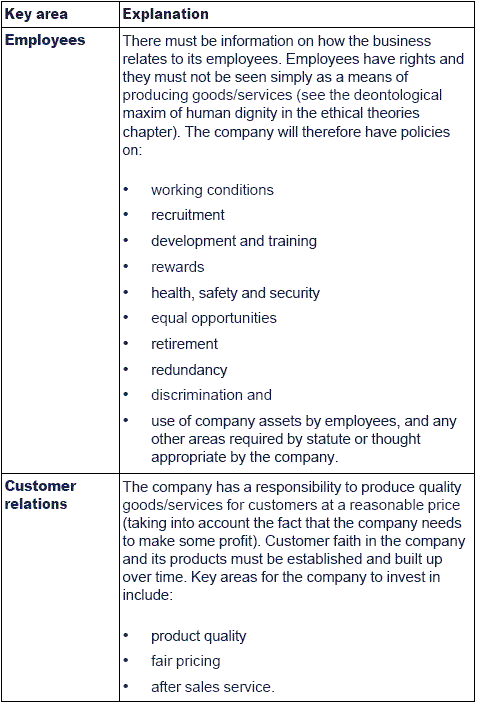
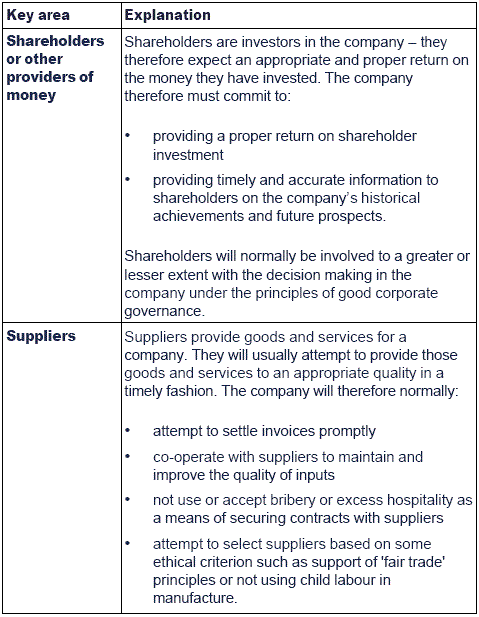
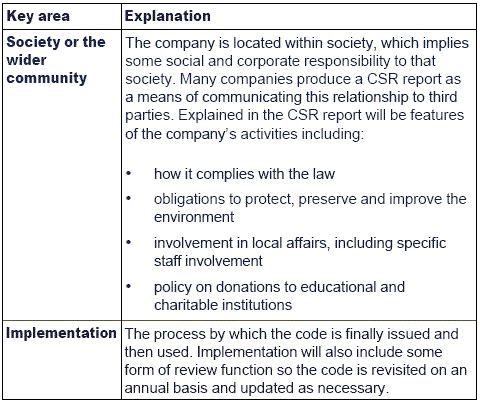

5 Corporate and professional codes
Purpose of corporate and professional codes
The presence of a code may assist in resolving an ethical dilemma.
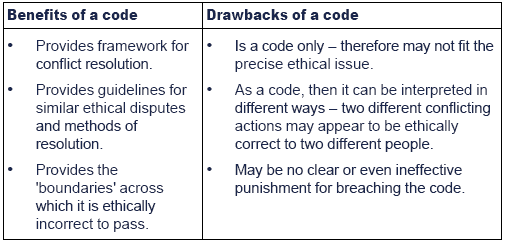
Effectiveness of corporate and professional codes
The effectiveness of the code will be limited due to factors such as:
- the code can be imposed without communication to explain what it is trying to achieved; this will only lead to resentment, particularly amongst employees
- some codes are written, launched and then forgotten as it is now 'in place'. Unless there are reminders that the code is there, then it will not be effective in promoting ethical decision making
- codes that are implemented, and then breached by senior management without apparent penalty are not going to be followed by more junior staff.
To be effective, the code must have:
- participation from all groups as the code is formed (to encourage 'buy in')
- disciplinary actions for breach of the code
- publicity of breaches and actions taken, as this is effective in promoting others to follow the code
- communication and support from top-down to ensure that the code is embedded into company culture.
6 Professional codes of ethics
Content
Professional codes of ethics are issued by most professional bodies; the ACCA code was revised and reissued in 2006.
- The main reason for professional codes of ethics is to ensure that members/students observe proper standards of professional conduct (as discussed in section 1 of this chapter).
- Members and students will therefore refrain from misconduct and not make any serious departure from the ethical code.
- If the standards are not observed, then disciplinary action may be taken.
- Maintenance of a professional code of ethics helps the accountancy profession to act in the public interest by providing appropriate regulation of members.

 Content of a professional code of ethics
Content of a professional code of ethics
The following are usually included:


 Principles
Principles
Behind a professional code of ethics, there are underpinning principles, the main ones being:
- integrity
- objectivity
- professional competence
- confidentiality, and
- professional behaviour.
Fundamental ethical principles are obligations (or responsibilities) placed on members of a professional institute.
- Principles apply to all members, whether or not they are in practice.
- The conceptual framework provides guidance on how the principles are applied.
- The framework also helps identify threats to compliance with the principles and then applies safeguards to eliminate or reduce those threats to acceptable levels.
- Five fundamental principles (taken from the ACCA code of conduct) are shown above.

 Fundamental ethical principles
Fundamental ethical principles
Integrity
Integrity implies fair dealing and truthfulness.
Members are also required not to be associated with any form of communication or report where the information is considered to be:
- materially false or to contain misleading statements
- provided recklessly
- incomplete such that the report or communication becomes misleading by this omission.
Objectivity
Accountants need to ensure that their business/professional judgement is not compromised because of bias or conflict of interest.
However, there are many situations where objectivity can be compromised, so a full list cannot be provided. Accountants are warned to always ensure that their objectivity is intact in any business/professional relationship.
Professional competence and due care
There are two main considerations under this heading:
(1)Accountants are required to have the necessary professional knowledge and skill to carry out work for clients.
(2)Accountants must follow applicable technical and professional standards when providing professional services.
Appropriate levels of professional competence must first be attained and then maintained. Maintenance implies keeping up to date with business and professional developments, and in many institutes completion of an annual return confirming that continued professional development (CPD) requirements have been met.
Where provision of a professional service has inherent limitations (e.g. reliance on client information) then the client must be made aware of this.
Confidentiality
The principle of confidentiality implies two key considerations for accountants:
(1)Information obtained in a business relationship is not disclosed outside the firm unless there is a proper and specific authority or unless there is a professional right or duty to disclose.
(2)Confidential information acquired during the provision of professional services is not used to personal advantage.
The need to maintain confidentiality is normally extended to cover the accountants' social environment, information about prospective clients and employers, and where business relationships have terminated. Basically there must always be a reason for disclosure before confidential information is provided to a third party.
The main reasons for disclosure are when it is:
(1)permitted by law and authorised by the client
(2)required by law, e.g. during legal proceedings or disclosing information regarding infringements of law
(3)there is professional duty or right to disclose (when not barred by law), e.g. provision of information to the professional institute or compliance with ethical requirements.
Ethical considerations on disclosure
The accountant needs to consider the extent to which third parties may be adversely affected by any disclosure.
The amount of uncertainty inherent in the situation may affect the extent of disclosure – more uncertainty may mean disclosure is limited or not made at all.
The accountant needs to ensure that disclosure is made to the correct person or persons.
Professional behaviour
Accountants must comply with all relevant laws and regulations.
There is also a test whereby actions suggested by a third party which would bring discredit to the profession should also be avoided.
An accountant is required to treat all people contacted in a professional capacity with courtesy and consideration. Similarly, any marketing activities should not bring the profession into disrepute.


 Test your understanding 3
Test your understanding 3
Explain why each of the following actions appears to be in conflict with fundamental ethical principles.
(1)An advertisement for a firm of accountants states that their audit services are cheaper and more comprehensive than a rival firm.
(2)An accountant prepares a set of accounts prior to undertaking the audit of those accounts.
(3)A director discusses an impending share issue with colleagues at a golf club dinner.
(4)The finance director attempts to complete the company's taxation computation following the acquisition of some foreign subsidiaries.
(5)A financial accountant confirms that a report on his company is correct, even though the report omits to mention some important liabilities.

7 Conflicts of interest and ethical threats
 Conflicts of interest and their resolution are explained in the conceptual framework to the code of ethics.
Conflicts of interest and their resolution are explained in the conceptual framework to the code of ethics.
- A framework is needed because it is impossible to define every situation where threats to fundamental principles may occur or the mitigating action required.
- Different assignments may also create different threats and mitigating actions – again it is not possible to detail all the assignments an accountant undertakes.
- The framework helps to identify threats – using the fundamental principles as guidance.
- This approach is preferable to following a set of rules – which may not be applicable. (see later in this chapter).
- Once a material threat has been identified, mitigating activities will be performed to ensure that compliance with fundamental principles is not compromised.
- Where conflicts arise in the application of fundamental principles, the code of ethics provides guidance on how to resolve the conflict.
Conflicts of interest
The potential threats which may lead to conflicts of interest and lack of independence were discussed in detail in the audit and compliance chapter. These are:
- self-interest
- self-review
- advocacy
- familiarity
- intimidation.
A threat to independence is any matter, real or perceived, that implies the accountant is not providing an independent view or report in a specific situation.
- An accountant needs to be independent so others can place reliance on his/her work.
- Lack of independence implies bias, meaning less reliance would be placed.

 Threats to independence
Threats to independence
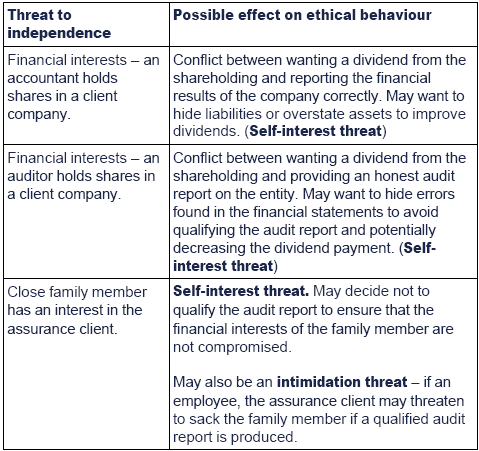
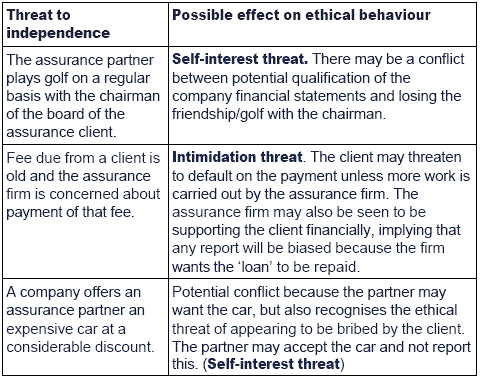
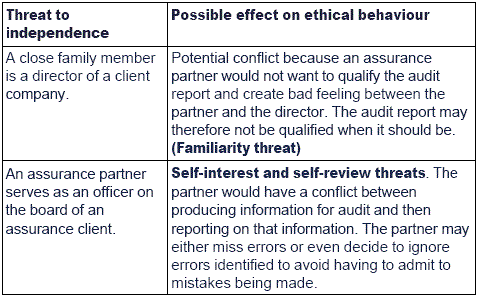

8 Conceptual framework and safeguards
A conceptual framework can be explained as follows:
- It provides an initial set of assumptions values and definitions which are agreed upon and shared by all those subject to the framework.
- It is stated in relatively general terms so it is easy to understand and communicate.
- It recognises that ethical issues may have no 'correct' answer and therefore provides the generalised guidelines and principles to apply to any situation.
Safeguards
Safeguards seek to reduce or eliminate threats. They fall into three categories created by the:
 Ethical threats and safeguards
Ethical threats and safeguards
- An ethical threat is a situation where a person or corporation is tempted not to follow their code of ethics.
- An ethical safeguard provides guidance or a course of action which attempts to remove the ethical threat.
- Ethical threats apply to accountants – whether in practice or business.
- The safeguards to those threats vary depending on the specific threat.
- The professional accountant must always be aware that fundamental principles may be compromised and therefore look for methods of mitigating each threat as it is identified.

 Ethical threats and safeguards
Ethical threats and safeguards
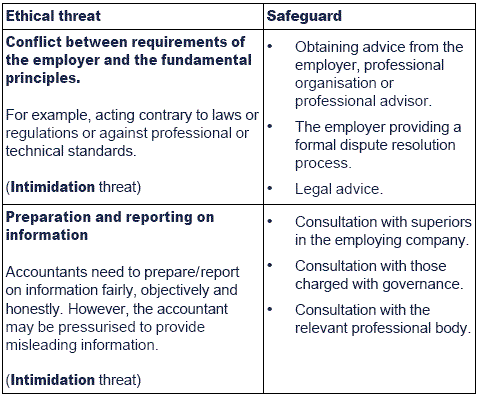
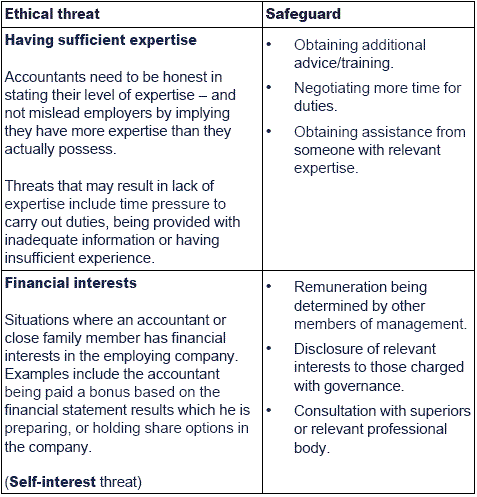
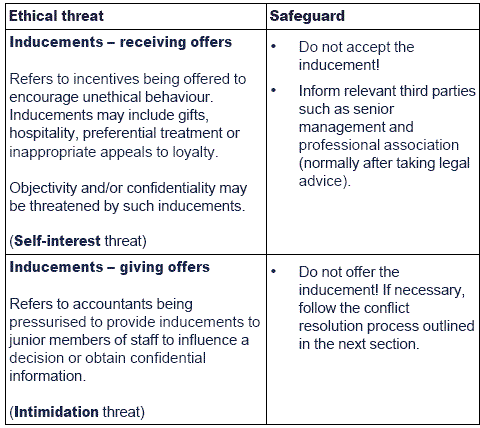


9 Ethical dilemmas and conflict resolution
Rules- and principles-based approaches
- Most professional institutes use a principles-based approach to resolving ethical dilemmas.
- Use of a rules-based approach is normally inappropriate as rules cannot cover every eventuality.

 Rules- and principles-based approaches
Rules- and principles-based approaches
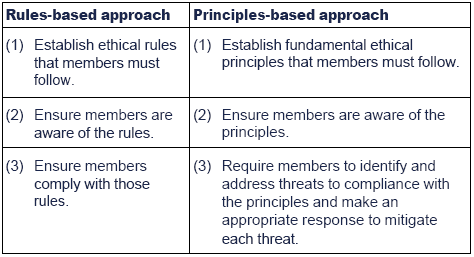

Rules-based approach
Benefits:
- Easy to check compliance as based on fact.
- Easy to amend rule set as required.
Disadvantages:
- The list of rules may not be complete.
- There is no room for individual decision making.
Principles-based approach
Benefits:
- Recognises that every threat cannot simply be 'listed'.
- Allows for subjective judgement, so the member can apply the principles in accordance with their specific situation and nature of the threat.
Disadvantages:
- In some situations it may be difficult to confirm that the compliance action was appropriate as two people may make different and valid decisions based on the same threat and circumstances.
These points can be related back to rules- and principles-based approaches to corporate governance, discussed in chapter 6.
 Ethical conflict resolution
Ethical conflict resolution
Ethical conflicts can be resolved as follows:
(1)Gather all relevant facts.
(2)Establish ethical issues involved.
(3)Refer to relevant fundamental principles.
(4)Follow established internal procedures.
(5)Investigate alternative courses of action.
(6)Consult with appropriate persons within the firm.
(7)Obtain advice from professional institute.
(8)If the matter is still unresolved, consider withdrawing from the engagement team / assignment / role.
More will be seen in the following chapter on ethical decision making.

 Ethical conflict resolution
Ethical conflict resolution
Note that the diagram provides only one method of thinking through an ethical situation. Examination questions are more likely to ask for the factors that may be taken into consideration when making a decision, rather than following a global system. The diagram reminds you that there are many areas to take into account in ethical decision making, but that the structure of making that decision may not always be this clear.


 Test your understanding 4
Test your understanding 4
Explain your response to the following ethical threats.
AYour employer asks you to suggest to a junior manager that they will receive a large bonus for working overtime on a project to hide liabilities from the financial statements.
BIn selecting employees for a new division, you are advised to unfairly discriminate against one section of the workforce.
CYou have been asked to prepare the management accounts for a subsidiary located in South America in accordance with specific requirements of that jurisdiction. In response to your comment that you do not understand the accounting requirements of that jurisdiction, your supervisor states 'no problem, no one will notice a few thousand dollars' error anyway'.

10 Corruption and Bribery
Introduction
Corruption is now recognized to be one of the world's greatest challenges.
For example, KPMG surveyed FTSE 100 companies in August 2009 and found that two thirds said it was not possible to do business in some countries without being involved in bribery and corruption, yet only 35 percent had stopped doing business there.
The World Bank has stated that "bribery has become a $1 trillion industry".
What is corruption?
Corruption is bribery and any other behaviour in relation to persons entrusted with responsibilities in the public or private sector which violates their duties and is aimed at obtaining undue advantages of any kind for themselves or for others.
The main forms of corruption are bribery, embezzlement, fraud and extortion.
Examples include but are not limited to
- Bribery, including excessive 'hospitality '
Note: firms are allowed to provide hospitality, promotional or other business expenditure. For example, to provide tickets to sporting events, take clients to dinner, offer gifts to clients as a reflection of good relations, or pay for reasonable travel expenses in order to demonstrate goods or services to clients if that is reasonable and proportionate for your business.
However where hospitality is really a cover for bribing someone, the authorities would look at such things as the level of hospitality offered, the way in which it was provided and the level of influence the person receiving it had on the business decision in question.
- Facilitation payments
Facilitation payments are additional payments to induce officials to perform routine functions they are otherwise obligated to perform. For example, additional payments to customs officials so they prioritise processing the import of your goods.
The distinction between facilitation and bribery is not always clear. Some countries (e.g. the United Kingdom and Germany) criminalise facilitation payments abroad. Other countries, such as the United States, do not prohibit such payments abroad and have no upper limit for them, although only very low amounts of money would be regarded as facilitation payments rather than outright bribes.
Note: you can pay for legally required administrative fees or fast-track services. These are not facilitation payments.
- Buying votes
- Illicit payments to political parties
- Misappropriation of public funds
Why corruption is wrong - the ethical argument
Corruption is inherently wrong:
- It is a misuse of power and position and has a disproportionate impact on the poor and disadvantaged.
- It undermines the integrity of all involved and damages the fabric of the organizations to which they belong.
The reality that laws making corrupt practices criminal may not always be enforced is no justification for accepting corrupt practices. To fight corruption in all its forms is simply the right thing to do.
Why corruption is wrong - the business argument
There are many reasons why it is in any company's business interest to ensure that it does not engage in corrupt practices:
- Legal risks
Regardless of what form a corrupt transaction may take, there are obvious legal risks involved. Not only are most forms of corruption illegal where it occurs, but also it is increasingly becoming illegal in a company's home country to engage in corrupt practices in another country.
- Reputational risks
Based on the experience of recent years, companies whose policies and practices fail to meet high ethical standards, or that take a relaxed attitude to compliance with laws, are exposed to serious reputational risks. The argument that although what they may have done may have been against the law or international standards, it was simply the way business was done in a particular country is not an acceptable excuse. Nor is it good enough to claim that other companies and competitors have engaged in similar practices.
- Financial costs
There is now clear evidence that in many countries corruption adds upwards of 10 per cent to the cost of doing business and that corruption adds as much as 25 per cent to the cost of public procurement. This undermines business performance and diverts public resources from legitimate sustainable development.
- Pressure to repeat offend
There is growing evidence that a company is less likely to be under pressure to pay bribes if it has not done so in the past. Once a bribe is paid, repeat demands are possible and the amounts demanded are likely to rise. Zero tolerance is the only practical solution.
- Blackmail
By engaging in corrupt practices, company managers expose themselves to blackmail. Consequently the security of staff, plant and other assets are put at risk.
- Impact on staff
If a company engages in or tolerates corrupt practice, it will soon be widely known, both internally and externally. Unethical behaviour erodes staff loyalty to the company and it can be difficult for staff to see why high standards should be applied within a company when it does not apply in the company's external relations. Internal trust and confidence is then eroded.
- Impact on development
It is now clear that corruption has played a major part in undermining the world's social, economic and environmental development. Resources have been diverted to improper use and the quality of services and materials used for development seriously compromised.
Business has a vested interest in social stability and in the economic growth of local communities. It has therefore suffered, albeit indirectly, from the impact of lost opportunities to extend markets and supply chains.
Relevant legislation
It is becoming increasingly illegal in a company's home country to engage in corrupt practices in another country.
- The US Foreign and Corrupt Practices Act (1977)
The principle that it is illegal to bribe foreign officials was first established in the US Foreign and Corrupt Practices Act of 1977. This Act gives the Federal authorities power to prosecute companies who have almost any kind of US footprint, not just US firms.
- The UN Convention against Corruption (2003)
Since then, this principle has gained legal standing within the whole of the OECD and in a number of other countries. It is a principle that was universally recognized in 2003, through the adoption of the UN Convention against Corruption.
- The UK Bribery Act (2010)
More recently the UK Bribery Act 2010, which applies to all UK businesses, overseas businesses with some presence in the UK and UK registered businesses operating overseas, details four offences:
- Offering, promising or giving a bribe.
- Requesting, agreeing to receive or accepting a bribe.
- Bribing a foreign public official.
- A corporate offence of failing to prevent bribery.
A commercial organisation is now liable for the activities of associated third parties. It will be guilty of an offence when one of them bribes another person with the intention of obtaining or retaining business, or a business advantage for the organisation.
Corporate ignorance of individual wrong-doing will provide no protection against prosecution.
However, it is a defence if you can show that you had adequate procedures in place to prevent bribery.
Assessing risk exposure
Relevant factors to consider include:
- The particular country you want to do business in,
- The sector which you are dealing in,
- The value and duration of your project,
- The kind of business you want to do and
- The people you engage to do your business.
Evaluating anti-bribery and corruption (AB&C) procedures
As stated above, the UK Bribery Act means that many firms will now have to ensure that they have adequate procedures and controls to prevent bribery and corruption. Even for firms outside the jurisdiction of the UK Act, good corporate governance practices would suggest that firms should have adequate control procedures to reduce the risks associated with bribery and corruption.
The UK Act sets out six principles to help a business decide if they need to introduce changes.
(1) Proportionality.
Any action a business takes to introduce procedures only needs to be in proportion to the risks your business faces.
(2) Top-level commitment.
If you are running a business, the Ministry of Justice (MoJ) advises, you will want to show you have been active in ensuring your staff and key people you do business with understand you do not tolerate bribery.
(3) Risk assessment.
This shows you have considered the possible risks you face as a company, especially if you are entering into new business arrangements.
(4) Communication.
Communicating your policies and procedures to staff and others who will perform services for you.
(5) Due Diligence.
Knowing who you are dealing with can help protect business - so it's advised that you do a few checks and ask a few questions before engaging others to represent you in business.
(6) Monitoring and review.
You may want to keep an eye on any anti-bribery steps you take so that they keep pace with any changes in the risks your business faces.
Examples of AB&C measures and procedures
Measures include
- improved reporting,
- screening of staff and associates,
- accounting policies e.g., high-level approval for certain categories of payments,
- depth of audit,
- clear and transparent procurement regulations,
- controls on the setting of prices and discounts, and
- guidelines for handling major bids.
Other practical steps one can take to assess and mitigate risks include the following:
- Use simple internet searches to find out about the levels of corruption or bribery in the particular country you propose to do business in.
- Consult diplomatic posts for advice.
- Consult business representative bodies here and in the relevant country for up to date local knowledge.
- UK firms can use the Government-sponsored Business Anti-Corruption Portal aimed at small and medium sized businesses involved in overseas trade.
Barriers to implementing AB&C policies
A number of obstacles can be thrown up, or unwittingly created, when implementing AB&C policies:
- Competitive advantage.
The most obvious is the belief that new policies are a tedious and unnecessary chore, together with the fear that unscrupulous competitors will break any rule to win.
- Managerial apathy
Chief executives and finance directors may argue that they deal with risks every day and do not need new systems to spot bribery and corruption.
- Off-the-shelf solutions.
Many firms implement policy and off-the-shelf procedures before (or in place of) assessing their own unique circumstances.
For example, some companies operating in France have set up whistleblowing hotlines without realising that French law makes them potentially illegal.
- Corporate structures.
Decentralised organisations may have more complex issues to address, as do firms with far flung offices.
For example, many firms with distant operations tend to focus on the needs of the centre, rather than the local operations, making it more difficult to ensure that your sales team in, say, China, is following policy. A silo mentality can also get in the way because people tend to compartmentalise risk – financial, operational etc – rather than considering cross-cutting dangers.
- "Shadow" hierarchies.
The real dynamics of internal control are sometimes different from what appears on an organisational chart. Individual employees can wield power well beyond their formal spheres of responsibility. Shadow power networks not only facilitate bribery, they may have arisen in order to conceal it.
- Excessive pressure to hit targets
Internal controls can become marginalised in a culture of immediate results.
- Cultures of secrecy.
Excessive sensitivity about disclosure can prevent one part of a business from learning about incidents that have occurred elsewhere. Secrecy always works to the advantage of the corrupt employee or associated party.
- Heterogeneous cultures.
Problems can occur where any staff do not share the values of the organisation. Such situations can arise from mergers and acquisitions, rapid expansion, poor training of new staff or from inadequate supervision of overseas offices.

 The UN Global Compact
The UN Global Compact
The UN Global Compact is a strategic policy initiative for businesses that are committed to aligning their operations and strategies with ten universally accepted principles in the areas of human rights, labour, environment and anti-corruption. By doing so, business, as a primary driver of globalization, can help ensure that markets, commerce, technology and finance advance in ways that benefit economies and societies everywhere.
On 24 June 2004, during the UN Global Compact Leaders Summit it was announced that the UN Global Compact henceforth includes a tenth principle against corruption:
Principle 10: "Businesses should work against corruption in all its forms, including extortion and bribery."


 The UK Bribery Act 2010
The UK Bribery Act 2010
Introduction
- When does it apply from?
The UK Bribery Act 2010 becomes law on 1 July 2011.
- What is the purpose of the Act?
Fighting business corruption by modernising the law on bribery and corruption
- Who does it apply to?
The act applies to all UK businesses, overseas businesses with some presence in the UK and UK registered businesses operating overseas.
Criminal liability
The new piece of legislation makes paying or receiving a bribe, bribing a foreign official and failing to prevent bribery at corporate level criminal offences.
Examples:
- If a senior person, like an MD, commits a bribery offence.
- If someone, like an employee or agent, pays a bribe in order to win business for the company, to retain it or to gain a business advantage.
The Act is unusual in that a business can be guilty of an offence if a rogue employee or associate commits an offence even if the management are not aware of or condoned the unlawful behaviour. Because of this KPMG have described the Act as "one of the most draconian pieces of anti-bribery and corruption (AB&C) legislation in the world".
Defence
However, it is a defence if you can show that you had adequate procedures in place to prevent bribery. The Act thus forces firms to look at bribery and corruption as key business risks that need effective corporate governance and control systems to mitigate.
Potential punishments
The Act provides for unlimited fines.
An indication of the potential damage can be gleaned from the £2.25 million plus costs paid by Balfour Beatty in a civil action brought by the SFO (under older legislation) in 2008. This was despite prosecutors acknowledging there had been no financial benefit to any individual employee – and that the offence had taken place up to ten years before.


 Test your understanding 5
Test your understanding 5
A medium sized company ('A') has acquired a new customer in a foreign country ('B') where it operates through its agent company ('C').
Its bribery risk assessment has identified facilitation payments as a significant problem in securing reliable importation into B and transport to its new customer's manufacturing locations. These sometimes take the form of 'inspection fees' required before B's import inspectors will issue a certificate of inspection and thereby facilitate the clearance of goods.
Required
Outline some action A could take with respect to these facilitation payments.


 Test your understanding 6
Test your understanding 6
A company ('L') exports a range of seed products to growers around the globe. Its representative travels to a foreign country ('M') to discuss with a local farming co-operative the possible supply of a new strain of wheat that is resistant to a disease which recently swept the region. In the meeting, the head of the co-operative tells L's representative about the problems which the relative unavailability of antiretroviral drugs cause locally in the face of a high HIV infection rate.
In a subsequent meeting with an official of M to discuss the approval of L's new wheat strain for import, the official suggests that L could pay for the necessary antiretroviral drugs and that this will be a very positive factor in the Government's consideration of the licence to import the new seed strain. In a further meeting, the same official states that L should donate money to a certain charity suggested by the official which, the official assures, will then take the necessary steps to purchase and distribute the drugs.
L identifies this as raising potential bribery risks.
Required
Recommend steps L could make in this situation.

11 Chapter summary
Test your understanding answers

 Test your understanding 1
Test your understanding 1
(a)Disclosure in the public interest:
- Where a lack of disclosure would lead to lack of enforcement of appropriate laws.
- This would mean a criminal could continue a crime such as money laundering in breach of money laundering regulations.
- Where a lack of disclosure would decrease accountability or limit decision making of the public.
- Not providing information on illegal actions of companies (e.g. Enron) allows actions to continue to the long-term detriment of stakeholders.
- Where a lack of disclosure would impair the health and safety of the public.
- Not disclosing information on potential contamination of land by an organisation.
- Non-disclosure of this information would not be in the public interest as health and safety could be compromised.
(b)Lack of disclosure in the public interest:
- Where disclosure would adversely affect the economic interests of the jurisdiction in which the accountant is working.
- Disclosing price sensitive information on a company’s share price or details of interest rate movements before they had been authorised could harm businesses in the jurisdiction or the jurisdiction as a whole (exchange rate movements).
- Disclosure would be inappropriate because the public interest would be harmed.


 Test your understanding 2
Test your understanding 2
Situation A
Kohlberg
The junior accountant's actions appear to correspond to levels 1 and/or 2 of Kohlberg. For level 1, the decision not to disclose the accounting irregularity could be considered unethical and the junior has made that choice either because nothing will happen or there is a fear of punishment if the action is taken.
Alternatively the decision not to disclose corresponds to level 2 in that the employee is simply following the actions expected by peers. As other junior accountants have either not disclosed the problem or been told of the adverse effects of disclosure, there is peer pressure to take the same action as this is 'normal'. The junior can justify the lack of disclosure because the action being taken is the same as that chosen by others in the same situation.
Public interest
Lack of disclosure of the full extent of the group's liabilities can mean that the company is not being fully accountable for its actions and the decision-making ability of shareholders and the public in respect of the company is being limited. The hiding of liabilities is against the principle of business probity, that is, the company and the finance director are not acting ethically. Decision-making ability is limited because full disclosure of the financial situation of the company may cause some potential investors not to invest when they actually have invested and some shareholders to sell their shares rather than keeping them.
The junior accountant should consider other reporting possibilities, for example to the audit committee. Lack of reporting is not serving the public interest as the company's accounts are being incorrectly stated.
Situation B
Kohlberg
The action of the senior auditor appears to be level 3 – post conventional.
The easiest option would be to bow to pressure from the client and not disclose – that is to conform to the actions of what other people expect. In this case disclosure would not be made because the board expect this.
However, the auditor does make disclosure even though there is potential for loss of income from taking that course of action. The auditor makes a decision based on the ethical principles which hopefully everyone follows (although the board does not in this case). In effect the auditor is a whistleblower – there is a strong sense of ethics and those ethics are followed even with the potential for adverse effect.
Public interest
The lack of appropriate labelling on the egg packaging is certainly misinforming the public and may be dangerous.
Incorrect information is provided because the eggs may not be free range and they are certainly not certified by a third party. The eggs are therefore being sold under false pretences and the public have a right to know under what conditions the eggs were produced. Furthermore, as free range eggs are sold at a premium price, then the company may also be making a secret profit, which goes against the concept of business probity.
The eggs may be dangerous because the company has had no control over the conditions in which they were produced. The chickens could have been diseased or the eggs transported in incorrect conditions making them harmful to human health.
The senior auditor has, therefore, made the correct decision in reporting the company to the government department, even though there may have been no obligation to report. The interest and safety of the public has to be put before the income of the accountant.


 Test your understanding 3
Test your understanding 3
(1)Potential conflict with professional behaviour – audit services observe the same standards, therefore implying that a rival has lower standards suggests that a firm is not complying with professional standards.
(2)The accountant is likely to lose objectivity because errors in the accounts made during preparation may not be identified when those accounts are reviewed.
(3)As the information is likely to be confidential, discussing it in a public place is inappropriate.
(4)The accountant needs to ensure that knowledge of the foreign country's taxation regime is understood prior to completing the return, otherwise there is the possibility that the appropriate professional skill will not be available.
(5)There is an issue of integrity. The accountant should not allow the report to be released because it is known that the report is incorrect.


 Test your understanding 4
Test your understanding 4
Threat A
- Do not offer the inducement!
- If necessary, follow the conflict resolution process of the employer.
- Consider the impact of the financial statements being misrepresented.
Threat B
- Obtaining advice from the employer, professional organisation or professional advisor.
- The employer providing a formal dispute resolution process.
- Legal advice.
Threat C
- Obtaining additional advice/training.
- Negotiating more time for duties.
- Obtaining assistance from someone with relevant expertise.


 Test your understanding 5
Test your understanding 5
Given that facilitation payments are normally viewed as examples of bribery and corruption, A should consider the following:
- Communication of its policy of non-payment of facilitation payments to C and its staff
- Seeking advice on the law of B relating to certificates of inspection and fees for these to differentiate between properly payable fees and disguised requests for facilitation payments.
- Building realistic timescales into the planning of the project so that shipping, importation and delivery schedules allow where feasible for resisting and testing demands for facilitation payments.
- Requesting that C train its staff about resisting demands for facilitation payments and the relevant local law and provisions of relevant legislation such as the UK Bribery Act 2010.
- Proposing or including as part of any contractual arrangement certain procedures for C and its staff, which may include one or more of the following, if appropriate:
- questioning of legitimacy of demands
- requesting receipts and identification details of the official making the demand
- requests to consult with superior officials
- trying to avoid paying 'inspection fees' (if not properly due) in cash and directly to an official
- informing those demanding payments that compliance with the demand may mean that A (and possibly C) will commit an offence under A's domestic law
- informing those demanding payments that it will be necessary for C to inform A's country's embassy of the demand
- Maintaining close liaison with C so as to keep abreast of any local developments that may provide solutions and encouraging C to develop its own strategies based on local knowledge
- Use of any diplomatic channels or participation in locally active non-governmental organisations, so as to apply pressure on the authorities of B to take action to stop demands for facilitation payments.


 Test your understanding 6
Test your understanding 6
L could consider any or a combination of the following:
- Making reasonable efforts to conduct due diligence, including consultation with staff members and any business partners it has in country M in order to satisfy itself that the suggested arrangement is legitimate and in conformity with any relevant laws and codes applying to the foreign public official responsible for approving the product.
- It could do this by obtaining information on:
- M's local law on community benefits as part of Government procurement and, if no particular local law, the official status and legitimacy of the suggested arrangement
- the particular charity in question including its legal status, its reputation in M, and whether it has conducted similar projects, and any connections the charity might have with the foreign official in question, if possible.
- Adopting an internal communication plan designed to ensure that any relationships with charitable organisations are conducted in a transparent and open manner and do not raise any expectation of the award of a contract or licence.
- Adopting company-wide policies and procedures about the selection of charitable projects or initiatives which are informed by appropriate risk assessments.
- Training and support for staff in implementing the relevant policies and procedures of communication which allow issues to be reported and compliance to be monitored.
- If charitable donations made in country M are routinely channelled through government officials or to others at the official's request, a red flag should be raised and L may seek to monitor the way its contributions are ultimately applied, or investigate alternative methods of donation such as official 'off-set' or 'community gain' arrangements with the government of M.
- Evaluation of its policies relating to charitable donations as part of its next periodic review of its anti-bribery procedures.

 |
 |
 |
|
Created at 5/24/2012 12:37 PM by System Account
(GMT) Greenwich Mean Time : Dublin, Edinburgh, Lisbon, London
|
Last modified at 8/15/2012 8:58 AM by System Account
(GMT) Greenwich Mean Time : Dublin, Edinburgh, Lisbon, London
|
|
|
|
 |
Rating
:
|
 Ratings & Comments
(Click the stars to rate the page) Ratings & Comments
(Click the stars to rate the page)
|
 |
Tags:
|
|
|
|
|